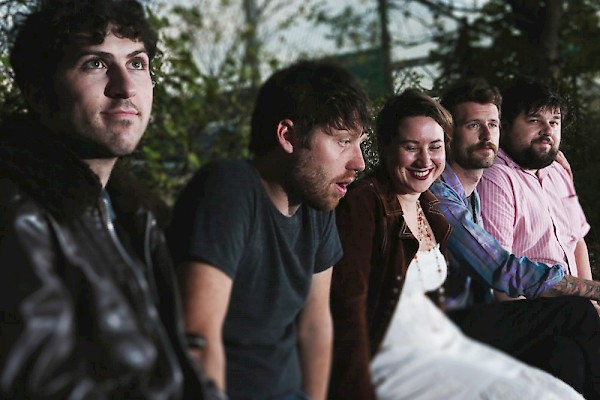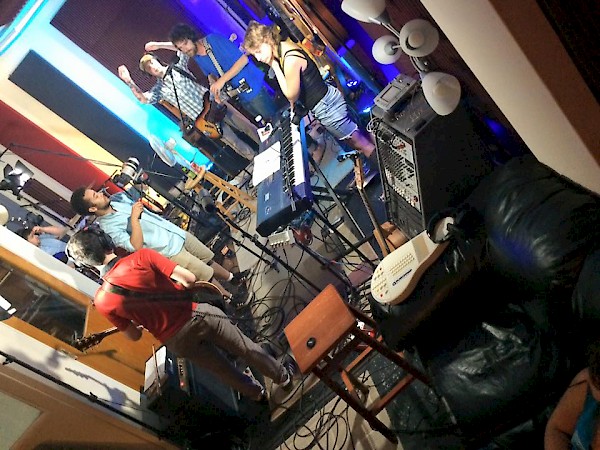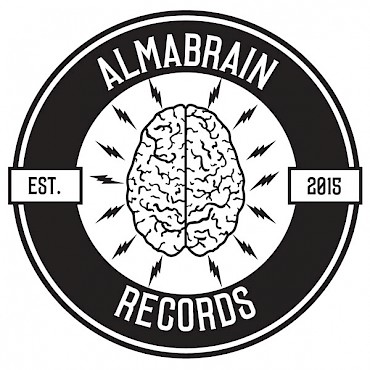 Câlisse, from left to right: Morganfield Riley, Kevin Hoffman, Karen Moore, James Collette and Rob IgguldenSummer was nearing the end of its peak. The sun had long since set by the time I pulled onto a side street just blocks away from the Doug Fir Lounge.
Câlisse, from left to right: Morganfield Riley, Kevin Hoffman, Karen Moore, James Collette and Rob IgguldenSummer was nearing the end of its peak. The sun had long since set by the time I pulled onto a side street just blocks away from the Doug Fir Lounge.
In my lap were the directions to a small studio nearby called Fur Vault PDX. Yet, from looking around, there weren’t any signs indicating that this was my destination. It wasn’t until I shuffled across the intersection of SE 10th and Sandy that a group of people standing in front of the designated address became visible. Assuming positive intent, I walked up to them.
A tall presence made his way toward me.
“Hi, you must be Joanna. I’m James and this is the band, Câlisse,” he extended one hand as the other waved to the rest of the group. Turning, he walked toward two older members within the group. “And these are my parents. They’re in town visiting, we’re just finishing up.”
The other bandmates playfully teased lead vocalist James Collette about needing parental guidance for the interview. Their exchange seemed genuine though, as if I had stumbled into a few friends hanging around for the night.
His parents said their goodbyes and promptly left. Everyone began to introduce themselves, putting faces to the names I’ve known only through email: Morganfield Riley as guitarist, Karen Moore on keys and backing vocals, and Rob Iggulden as the band’s drummer. The only exception was bassist Kevin Hoffman who joined us later in the evening. Without much immediacy but with the same friendly disposition, the founder of the band’s label, Almabrain, and their producer/engineer came forward.
“I’m Jason Driver, or JD. Whichever you prefer. Glad to finally meet you,” he shook my hand. Moving inside, we walked through a dimly lit maze of walls strewn with art until we finally came to the studio: Fur Vault PDX.
 Band rehearsal at Fur Vault PDXWe all found ways to get comfortable in the small space, forming a circle by the time we settled down, and a few in the group even cracked open cans of Fat Tire beer. Almost as if this kind of night were a common thing amongst us, casual conversation began with ease. We talked about what it means to be a Portland resident these days and how one might see him or herself within the sphere of the developing music community in this city.
Band rehearsal at Fur Vault PDXWe all found ways to get comfortable in the small space, forming a circle by the time we settled down, and a few in the group even cracked open cans of Fat Tire beer. Almost as if this kind of night were a common thing amongst us, casual conversation began with ease. We talked about what it means to be a Portland resident these days and how one might see him or herself within the sphere of the developing music community in this city.
“The cool thing about Portland is, everyone’s in a band,” Collette says. He jokes, “I’m actually doing a triangle solo project."
“Don’t forget the Zephyr,” Riley adds and everyone laughs. “But seriously. If you’re only in one band, you’re slacking!”
When the laughter dies, the questions begin. Who is Câlisse and what’s the band’s goal? Iggulden smirks after everyone pauses to chew on the question.
“I’m curious too,” he jokes.
Riley answers amid the group’s hesitant giggles. “I don’t think there were any expectations to what we’re supposed to be, but only because of how we started. James had these songs worked out on his acoustic and they were full-fledged songs. Then, he wanted to record this album. I started helping him with some of that.”
Collette and Riley were introduced through a mutual friend last year, initially because both were scoring films at the time. Despite a slow start to the friendship, they gradually grew to respect one another’s work.
 Their single “Omnibrain” was the result of their first collaboration late last year, using the equipment Collette had in his home at the time. There was more at stake, however, than two friends simply playing music together. The duo eventually came to realize their shared desire to create something more. They had the material, but they needed some sort of foundation.
Their single “Omnibrain” was the result of their first collaboration late last year, using the equipment Collette had in his home at the time. There was more at stake, however, than two friends simply playing music together. The duo eventually came to realize their shared desire to create something more. They had the material, but they needed some sort of foundation.
“That was the first song we started and the reaction went really well,” Riley continues. “We were both like, we should continue this, and soon it became a collection of songs.” The pair turned their focus toward creating a full-band sound, a decision which led them to the formation of Câlisse and, subsequently, to producer Jason Driver.
Câlisse formed in October 2014 when the duo enlisted Karen Moore, a longtime friend of Collette, to cover a series of songs by Neutral Milk Hotel. At the time, Moore played the part of backing vocalist. Eventually, when the group began to grow serious about recording, Collette approached schoolmate Rob Iggulden to be the band’s drummer. Despite his hectic schedule as a student nearing graduation and playing drums for local band Future Historians, Iggulden agreed.
“We got lucky. We all enjoyed working together,” Collette says.
With the band missing only a bassist, Kevin Hoffman came along at the right time. Having spent time in New Orleans, he was still fresh from moving back to Portland in early spring when he was approached by Collette. The two had known each prior to Hoffman’s trek to Louisiana and had kept in touch throughout his stay.
Together, the five-piece created a unique sound influenced by the elements of alternative rock intertwined with the emotional urgency in Collette's vocals. The next step was to find an affordable studio and jump-start the recording process.
“These guys called me to use the studio and booked it for two days. They came in and just rocked it, you know. I get a lot of bands that come in and aren’t prepared for the studio, so they get in here and start choking,” Driver pauses. “These guys came in and they had it together.”
Riley jumps in the conversation: “This was my first initial experience recording in a studio and it was the best. It was seriously awesome."
“We were a good fit,” Driver says.
“JD is artist-friendly and very supportive. We’re working really fairly with one another, which has given us [the band] a lot of opportunity to plant some seeds locally,” Collette says. “We have a lot of potential for making it work.”
“I want to be able to help a band like these guys and support them enough to get out there touring,” Driver adds. His own background involves a history of playing music as well. Although he initially began as an audio engineer, Driver switched professions early in his career and spent time working as a touring musician. Later, after he married and looked for ways to settle down, he returned to engineering. Regardless, his collection of gear naturally grew. This, combined with the small space he rents for his studio, has provided him with the opportunity to remain affordable and artist-friendly over the years.
 Almabrain logo by Collin BuenerkemperThe transition from musician to engineer changed his perspective on what he looks for when bands come to him for his services. “I really love when bands get that magic live. That’s one of the reasons I really like Câlisse. They came in with a band, they wanted to play it as a band, and I think that’s the most important part: how music becomes a kind of magic that happens between people,” Driver says.
Almabrain logo by Collin BuenerkemperThe transition from musician to engineer changed his perspective on what he looks for when bands come to him for his services. “I really love when bands get that magic live. That’s one of the reasons I really like Câlisse. They came in with a band, they wanted to play it as a band, and I think that’s the most important part: how music becomes a kind of magic that happens between people,” Driver says.
Hums of agreement echo among the rest of the group inside the studio. He continues, “That time I spent as a touring musician helped me to understand that there’s much more to engineering than just turning a knob or putting a mic in the right place. It’s more about getting the band in the right frame of mind so they can relax and play."
Collette sits on these words for a while. His own history of working with smaller independent labels in his native state of Mississippi prevents him from completely agreeing with his producer’s sentiments. “It’s still intimidating because there are so many talented people. You meet all these random people and you remember their music. There’s great music here. No one’s going to rub it in your face either, so you’re seeing it at face value.”
“There’s a lot of opportunity in Portland, for sure,” Iggulden chimes in.
“You take it as either intimidation or motivation,” Driver continues. “I have a lot of bands that come in and want to record a good album, but they don’t have the budget. This is like having some support where we can take some of the production costs and make some money back by selling albums. It’s a better business model as far as long-term growth is concerned. My initial decision to create Almabrain with Câlisse rode on that philosophy. ”
Processing the direction our conversation has taken, Collette interrupts: “When is it wrong for an artist to want to be sustainable? We just want to be able to play music and travel. Most importantly, we just want to continue playing. That’s the cool thing about Jason though. We instantly felt like good friends and we’ve actually become good friends since this started.”
Regarding the topic of business, I ask about the possibility of the band looking to crowdsourcing as a way of funding their efforts. Immediately, I'm met with an almost hostile “no” from Riley.
“We’re eager, but we’ve held off from being too eager to jump out there because we want to be sure we’re putting on the best performance that we can in Portland,” Collette explains, lingering briefly on the topic as a way to justify the outburst. “Like I said, there’s a lot of talented people here. We want to step our game up and earn our keep. We want to show we’re working hard.”
From there, the conversation strayed back into a casual tone and humor still remained much on everyone’s agenda as the evening came to a close. The relationship between Câlisse and their producer seemed strong to an outsider walking in that night, almost as if one couldn’t exist without the other. There was definitely a chord struck in the creative process, yet this venture is far from the finish line. The next step is to share the work.






